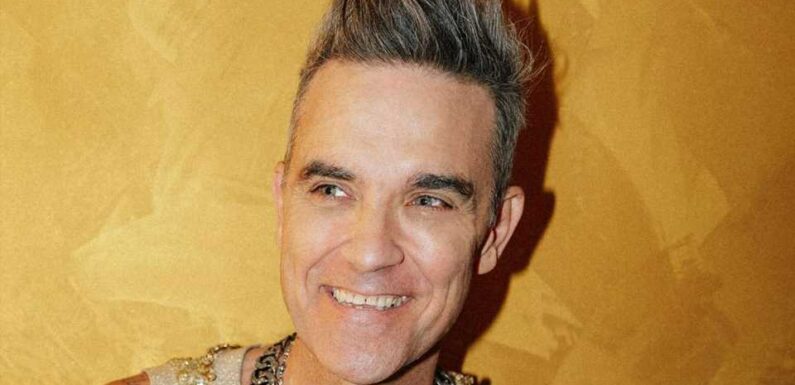
MARKED by signature hot flashes and brain fog, menopause has taken a prime spot in the media spotlight in recent years.
From battling HRT shortages to battles with bosses in the workplace, women have worked tirelessly to be taken seriously.
But women are not the only ones to experience it. Robbie Williams is the most recent in a string of fellas to open up about their struggles with what they call the 'male menopause', or andropause.
The superstar singer told The Sun in an exclusive interview: "I’ve used up all of the natural good stuff. I’ve got the manopause."
The male menopause can develop in men in their late 40s and early 50s, according to the NHS, and is characterised by a decline in testosterone levels.
Typical symptoms – which appear to align with menopause – include mood swings, loss of sex drive and muscle mass, difficulty sleeping and poor short-term memory.
Read more on manopause

Robbie Williams in plastic surgery confession as he claims he's got 'manopause'

Our poor fellas have new hardship – the MANopause… what a load of b*****ks
'An underlying health issue'
Yet, Dr Channa Jayasena, an endocrinologist based at Imperial College London, tells the Sun comparing the two is "troublesome" as the conditions are, in fact, very different.
In men, the drop in hormone levels happens gradually from the age of 30, and this is unlikely to cause any problems in itself.
But for some blokes, the plunge in testosterone happens much faster, and this is usually because of lifestyle factors like diet or disease, Dr Channa explains.
This is unlike menopause, a natural part of ageing in all women between 45 and 55.
Most read in Health

I’m a breast cancer surgeon – here’s 10 things I didn’t know until my diagnosis

The subtle sign you’re eating too much salt that you can spot in your hands

From exercise to meditation, eight ways to boost your immune system this winter

Crippling arthritis to agonising foot pain – Dr Jeff answers health questions
"Having low testosterone is a symptom of another underlying health issue which hasn't been addressed," Dr Channa says.
"Much like how women lose their periods when they are unwell, a drop in testosterone is the body's way of telling us something is wrong and not to have babies," he adds.
Common 'male menopause' causes include heart disease, uncontrolled type two diabetes, being obese, not sleeping enough and drinking too much alcohol.
"For the majority of men, the andropause is fully preventable; female menopause is not," he adds.
Manopause policies
Last month, an NHS Trust in the East Midlands announced it would be offering up to 12 months of paid leave to male staff affected by symptoms of low testosterone.
This is despite the NHS itself saying male menopause is not a clinical condition.
The hormone expert called the policy "complete madness".
"It misses the point that these men are probably suffering from underlying health issues," Dr Channa said.
"Instead, these middle-aged men must be encouraged to seek help and treatment."
HRT for men
Much like hormone replacement therapy (HRT) for women, men struggling with testosterone levels can get artificial boosts in the form of a jab or gel to help combat uncomfortable symptoms.
Happy Mondays star Shaun Ryder said HRT “changed my life”.
The 61-year-old once admitted “trying every drug around” but now uses testosterone gel to boost libido and energy.
Testosterone – which is prescribed on the NHS – is usually reserved for men whose plunging levels don't appear to be lifestyle-related, suggesting they have late-onset hypogonadism.
The rare condition causes delayed puberty and small testes, the NHS says.
Studies estimate that just two to six per cent of men suffer from late-onset hypogonadism, whereas all women will suffer some form of menopause.
Yet, Dr Channa says the NHS is seeing an increasing number of men who have either started testosterone themselves illegally or have been started by a private clinic.
"Most of these men should never have been on testosterone in the first place," he says.
Taking testosterone when it's not needed can increase the risk of blood clots, high blood pressure and cholesterol, he adds.
For these men, taking testosterone is a bit like "putting a plaster over a cut", the expert says.
"It'll mask the symptoms, but in reality, you're still unwell," he adds,
Menopause vs Manopause
Testosterone levels rise during puberty, usually between 10 and 14.
It causes boys to have deeper voices, bigger muscles, bigger bodies, and bigger facial hair.
The hormone also helps the testes create sperm.
Levels peak at 20, before slowly falling by around one per cent each year from the age of 30.
Sufferers of low testosterone commonly experience weight gain and gynecomastia, also known as man boobs.
And in severe cases, some suffer from erectile dysfunction.
But unlike women, these hormone changes don't render men infertile.
Menopause marks the point when a woman no longer has periods, marking the end of her fertility.
Almost nine in 10 women going through the menopause suffer symptoms like anxiety, mood swings and low self-esteem.
Hot flushes, sleeping difficulties, heart palpations, headaches, and muscle and joint pain are among a long list of agonising symptoms women experience.
Symptoms usually occur years before menopause officially begins, as periods start to become irregular.
Read More on The Sun

I’m a size 16 gypsy – people are always so shocked that I’m 'pretty AND fat'

'Hawaii of Europe' hols isle with summer all year & no UK time difference
This is called the perimenopause.
Once a woman reaches menopause – a year after her last period – symptoms can continue for even more years.
Source: Read Full Article


